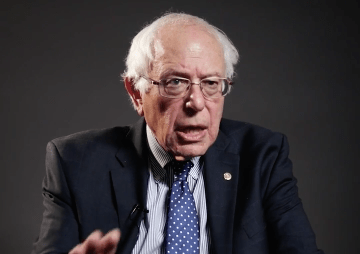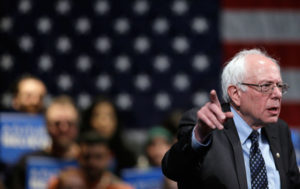WATCH: Bernie Sanders: The Koch Brothers Would Love to Open U.S. Borders
Democratic presidential candidate Bernie Sanders said he opposes opening U.S. borders to all immigrants on the basis that it would drive down wages by increasing the number of workers competing for American jobs.
In an interview with Vox Editor-in-Chief Ezra Klein, Democratic presidential candidate Bernie Sanders opposed the policy of opening U.S. borders to all immigrants on the basis that it would drive down wages by increasing the number of workers competing for domestic jobs.
Sanders is obviously committed to reducing the suffering of the poor. But his remarks will disturb many leftists, liberals and progressives who see tight restrictions on U.S. immigration as cruel to foreigners whose communities and livelihoods have been destroyed by the activities of U.S. corporations abroad. He will have to remain sensitive to their concerns and either explain his position more fully or adjust it if he wishes to avoid suffering a loss of confidence from a number of his supporters.
In the conversation, Klein suggests that Sanders’ espousal of democratic socialism entails putting certain international concerns before national ones with policies “like sharply raising the level of immigration we permit, even up to a level of open borders.”
Sanders responds: “Open borders? No. That’s a Koch brothers proposal. … a right-wing proposal” which [italics added]:
… would make everybody in America poorer—you’re doing away with the concept of a nation state, and I don’t think there’s any country in the world that believes in that. If you believe in a nation state or in a country called the United States or UK or Denmark or any other country, you have an obligation in my view to do everything we can to help poor people. What right-wing people in this country would love is an open-border policy. Bring in all kinds of people, work for $2 or $3 an hour, that would be great for them. I don’t believe in that. I think we have to raise wages in this country, I think we have to do everything we can to create millions of jobs.
You know what youth unemployment is in the United States of America today? If you’re a white high school graduate, it’s 33 percent, Hispanic 36 percent, African American 51 percent. You think we should open the borders and bring in a lot of low-wage workers, or do you think maybe we should try to get jobs for those kids?
I think from a moral responsibility we’ve got to work with the rest of the industrialized world to address the problems of international poverty, but you don’t do that by making people in this country even poorer.
Klein asks:
Then what are the responsibilities that we have? Someone who is poor by US standards is quite well off by, say, Malaysian standards, so if the calculation goes so easily to the benefit of the person in the US, how do we think about that responsibility?
We have a nation-state structure. I agree on that. But philosophically, the question is how do you weight it? How do you think about what the foreign aid budget should be? How do you think about poverty abroad?
Sanders replies:
I do weigh it. As a United States senator in Vermont, my first obligation is to make certain kids in my state and kids all over this country have the ability to go to college, which is why I am supporting tuition-free public colleges and universities. I believe we should create millions of jobs rebuilding our crumbling infrastructure and ask the wealthiest people in this country to start paying their fair share of taxes. I believe we should raise the minimum wage to at least 15 bucks an hour so people in this county are not living in poverty. I think we end the disgrace of some 20 percent of our kids living in poverty in America. Now, how do you do that?
What you do is understand there’s been a huge redistribution of wealth in the last 30 years from the middle class to the top tenth of 1 percent. The other thing that you understand globally is a horrendous imbalance in terms of wealth in the world. As I mentioned earlier, the top 1 percent will own more than the bottom 99 percent in a year or so. That’s absurd. That takes you to programs like the IMF and so forth and so on.
But I think what we need to be doing as a global economy is making sure that people in poor countries have decent-paying jobs, have education, have health care, have nutrition for their people. That is a moral responsibility, but you don’t do that, as some would suggest, by lowering the standard of American workers, which has already gone down very significantly.
The exchange begins at the 5:50 mark in the full-length clip above.
— Posted by Alexander Reed Kelly.
Your support matters…Independent journalism is under threat and overshadowed by heavily funded mainstream media.
You can help level the playing field. Become a member.
Your tax-deductible contribution keeps us digging beneath the headlines to give you thought-provoking, investigative reporting and analysis that unearths what's really happening- without compromise.
Give today to support our courageous, independent journalists.






You need to be a supporter to comment.
There are currently no responses to this article.
Be the first to respond.